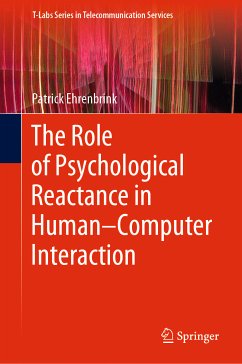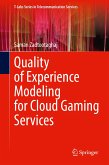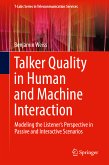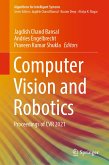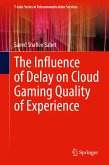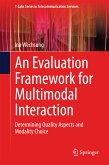Patrick Ehrenbrink
The Role of Psychological Reactance in Human–Computer Interaction (eBook, PDF)
53,49 €
inkl. MwSt.
Sofort per Download lieferbar
Patrick Ehrenbrink
The Role of Psychological Reactance in Human–Computer Interaction (eBook, PDF)
- Format: PDF
- Merkliste
- Auf die Merkliste
- Bewerten Bewerten
- Teilen
- Produkt teilen
- Produkterinnerung
- Produkterinnerung

Bitte loggen Sie sich zunächst in Ihr Kundenkonto ein oder registrieren Sie sich bei
bücher.de, um das eBook-Abo tolino select nutzen zu können.
Hier können Sie sich einloggen
Hier können Sie sich einloggen
Sie sind bereits eingeloggt. Klicken Sie auf 2. tolino select Abo, um fortzufahren.

Bitte loggen Sie sich zunächst in Ihr Kundenkonto ein oder registrieren Sie sich bei bücher.de, um das eBook-Abo tolino select nutzen zu können.
This book provides an in-depth investigation on the psychological phenomenon "reactance“ in the context of Human-Computer Interaction (HCI). The author argues that the complexity and autonomy of modern technology can sometimes be overwhelming and can then be perceived as a threat to freedom by its users, thereby diminishing acceptance. The book investigates if and how this is the case and provides strategies to regain the lost acceptance. Topics include relevance of reactance on HCI, triggers for reactance, consequences of reactance, measurement of reactance, and countermeasures to reactance.
- Geräte: PC
- ohne Kopierschutz
- eBook Hilfe
- Größe: 2.41MB
- Upload möglich
Andere Kunden interessierten sich auch für
![Quality of Experience Modeling for Cloud Gaming Services (eBook, PDF) Quality of Experience Modeling for Cloud Gaming Services (eBook, PDF)]() Saman ZadtootaghajQuality of Experience Modeling for Cloud Gaming Services (eBook, PDF)117,69 €
Saman ZadtootaghajQuality of Experience Modeling for Cloud Gaming Services (eBook, PDF)117,69 €![Increasing Naturalness and Flexibility in Spoken Dialogue Interaction (eBook, PDF) Increasing Naturalness and Flexibility in Spoken Dialogue Interaction (eBook, PDF)]() Increasing Naturalness and Flexibility in Spoken Dialogue Interaction (eBook, PDF)171,19 €
Increasing Naturalness and Flexibility in Spoken Dialogue Interaction (eBook, PDF)171,19 €![Talker Quality in Human and Machine Interaction (eBook, PDF) Talker Quality in Human and Machine Interaction (eBook, PDF)]() Benjamin WeissTalker Quality in Human and Machine Interaction (eBook, PDF)53,49 €
Benjamin WeissTalker Quality in Human and Machine Interaction (eBook, PDF)53,49 €![Computer Vision and Robotics (eBook, PDF) Computer Vision and Robotics (eBook, PDF)]() Computer Vision and Robotics (eBook, PDF)223,63 €
Computer Vision and Robotics (eBook, PDF)223,63 €![Human-Friendly Robotics 2020 (eBook, PDF) Human-Friendly Robotics 2020 (eBook, PDF)]() Human-Friendly Robotics 2020 (eBook, PDF)181,89 €
Human-Friendly Robotics 2020 (eBook, PDF)181,89 €![The Influence of Delay on Cloud Gaming Quality of Experience (eBook, PDF) The Influence of Delay on Cloud Gaming Quality of Experience (eBook, PDF)]() Saeed Shafiee SabetThe Influence of Delay on Cloud Gaming Quality of Experience (eBook, PDF)128,39 €
Saeed Shafiee SabetThe Influence of Delay on Cloud Gaming Quality of Experience (eBook, PDF)128,39 €![An Evaluation Framework for Multimodal Interaction (eBook, PDF) An Evaluation Framework for Multimodal Interaction (eBook, PDF)]() Ina WechsungAn Evaluation Framework for Multimodal Interaction (eBook, PDF)96,29 €
Ina WechsungAn Evaluation Framework for Multimodal Interaction (eBook, PDF)96,29 €-
-
-
This book provides an in-depth investigation on the psychological phenomenon "reactance“ in the context of Human-Computer Interaction (HCI). The author argues that the complexity and autonomy of modern technology can sometimes be overwhelming and can then be perceived as a threat to freedom by its users, thereby diminishing acceptance. The book investigates if and how this is the case and provides strategies to regain the lost acceptance. Topics include relevance of reactance on HCI, triggers for reactance, consequences of reactance, measurement of reactance, and countermeasures to reactance.
Produktdetails
- Produktdetails
- Verlag: Springer International Publishing
- Erscheinungstermin: 25. Oktober 2019
- Englisch
- ISBN-13: 9783030303105
- Artikelnr.: 58388773
- Verlag: Springer International Publishing
- Erscheinungstermin: 25. Oktober 2019
- Englisch
- ISBN-13: 9783030303105
- Artikelnr.: 58388773
Patrick Ehrenbrink studied Cognitive Science at University of Osnabrück and Human Factors at Technische Universität Berlin. He completed his PhD at the Quality and Usability Lab at Technische Universität Berlin. He was also appointed as a Research Fellow at the University of Technology, Sydney. He has published in several major journals and conference proceedings.
Introduction.- Part I.- Motivation.- Part II Relevance of Psychological Reactance in Human-Computer Interaction.- Psychological Reactance Relevant for Human-Computer Interaction.- Literature Search – Reactance in Literature.- Expert Survey-Triggers for State Reactance.- Smart Home Study-Trait Reactance.- Intermediate Discussion on the Relevance of Psychological Reactance for Human-Computer Interaction.- Part III Measurement of State Reactance.- Research Question: How can State Reactance be Measured.- Reactance Scale for Human-Computer Interaction.- Validation.- Intermediate Discussion on the Reactance Scale for Human-Computer Interaction.- Part IV Determinants of State Reactance.- Research Question: What Factors Influence State Reactance.- Persuasive Assistant Study-Moderator Variables.- Intermediate Discussion on Determinants of State Reactance.- Part V General Discussion.- Research Outcomes.- Outlook and Future Research.- Conclusion.
Introduction.- Part I.- Motivation.- Part II Relevance of Psychological Reactance in Human-Computer Interaction.- Psychological Reactance Relevant for Human-Computer Interaction.- Literature Search - Reactance in Literature.- Expert Survey-Triggers for State Reactance.- Smart Home Study-Trait Reactance.- Intermediate Discussion on the Relevance of Psychological Reactance for Human-Computer Interaction.- Part III Measurement of State Reactance.- Research Question: How can State Reactance be Measured.- Reactance Scale for Human-Computer Interaction.- Validation.- Intermediate Discussion on the Reactance Scale for Human-Computer Interaction.- Part IV Determinants of State Reactance.- Research Question: What Factors In uence State Reactance.- Persuasive Assistant Study-Moderator Variables.- Intermediate Discussion on Determinants of State Reactance.- Part V General Discussion.- Research Outcomes.- Outlook and Future Research.- Conclusion.
Introduction.- Part I.- Motivation.- Part II Relevance of Psychological Reactance in Human-Computer Interaction.- Psychological Reactance Relevant for Human-Computer Interaction.- Literature Search – Reactance in Literature.- Expert Survey-Triggers for State Reactance.- Smart Home Study-Trait Reactance.- Intermediate Discussion on the Relevance of Psychological Reactance for Human-Computer Interaction.- Part III Measurement of State Reactance.- Research Question: How can State Reactance be Measured.- Reactance Scale for Human-Computer Interaction.- Validation.- Intermediate Discussion on the Reactance Scale for Human-Computer Interaction.- Part IV Determinants of State Reactance.- Research Question: What Factors Influence State Reactance.- Persuasive Assistant Study-Moderator Variables.- Intermediate Discussion on Determinants of State Reactance.- Part V General Discussion.- Research Outcomes.- Outlook and Future Research.- Conclusion.
Introduction.- Part I.- Motivation.- Part II Relevance of Psychological Reactance in Human-Computer Interaction.- Psychological Reactance Relevant for Human-Computer Interaction.- Literature Search - Reactance in Literature.- Expert Survey-Triggers for State Reactance.- Smart Home Study-Trait Reactance.- Intermediate Discussion on the Relevance of Psychological Reactance for Human-Computer Interaction.- Part III Measurement of State Reactance.- Research Question: How can State Reactance be Measured.- Reactance Scale for Human-Computer Interaction.- Validation.- Intermediate Discussion on the Reactance Scale for Human-Computer Interaction.- Part IV Determinants of State Reactance.- Research Question: What Factors In uence State Reactance.- Persuasive Assistant Study-Moderator Variables.- Intermediate Discussion on Determinants of State Reactance.- Part V General Discussion.- Research Outcomes.- Outlook and Future Research.- Conclusion.
